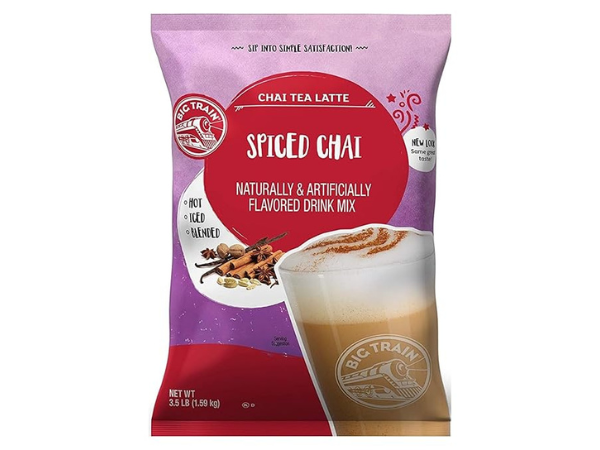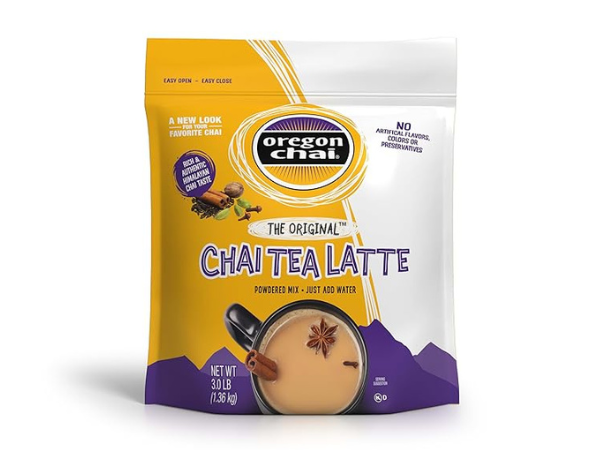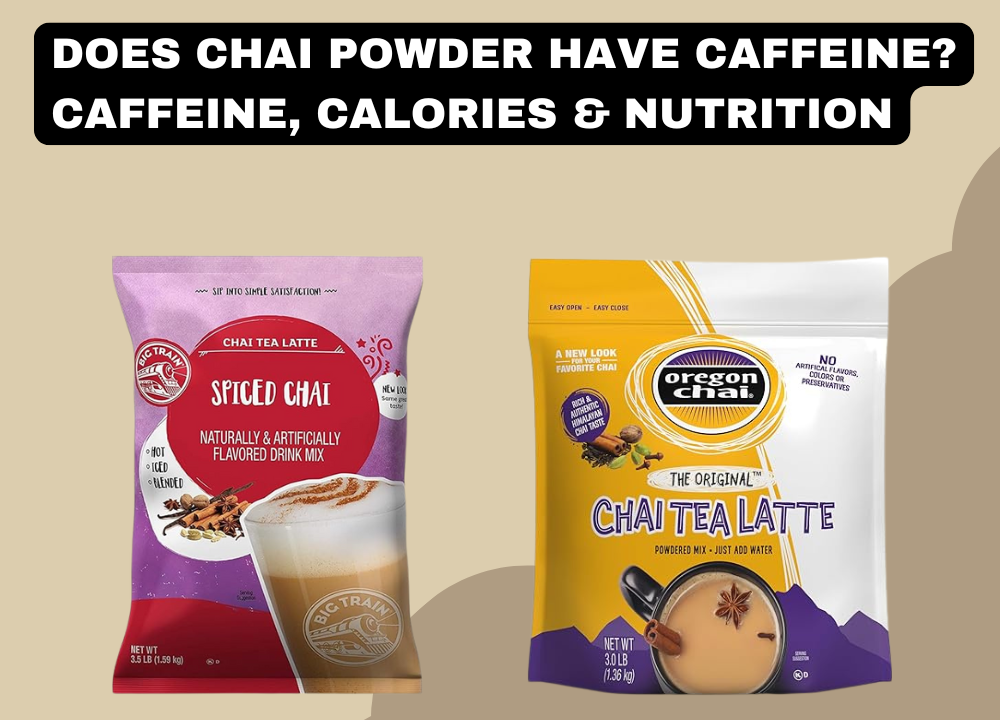Chai tea has become a favorite drink for many. Its rich flavors and aromatic spices make it comforting and delicious. How much caffeine is in chai powder? What about calories and nutrition?
Understanding these aspects can help you make informed choices about your daily beverage. Let’s explore what chai powder brings to the table.
What Exactly Is Chai Powder?
Chai powder is an instant mix of tea, spices, milk powder, and sweeteners. It is used for making chai lattes quickly and easily.
The primary component is black tea extract or powder. This gives chai its base flavor and caffeine content. The spices used in chai powder include:
- Cinnamon
- Cardamom
- Ginger
- Cloves
- Black pepper
These spices add warmth and depth to the drink. Chai powder may also contain sugar or other sweeteners. The inclusion of milk powder or non-dairy creamer provides a creamy texture.

Traditional Ingredients In Chai Powder
Chai powder’s appeal lies in its traditional ingredients. Each component plays a vital role in creating the drink’s flavor. The blend typically includes:
- Black tea: This is the foundation of chai powder.
- Spices: Cinnamon, cardamom, ginger, cloves, and black pepper add unique flavors.
- Milk powder: This ingredient creates a creamy texture.
- Sugar or sweeteners: These enhance the overall taste.
Spices like ginger and cardamom are known for their health benefits. They can aid digestion and boost immunity. The balance of flavors in chai powder is what makes it so special.
Is Tea Powder Good For You? Potential Health Benefits
Is tea powder good for you? Yes, it has potential health benefits that can positively impact your body. Let’s explore these benefits in detail.
Rich In Antioxidants And Anti-inflammatory Compounds
Chai powder is rich in antioxidants and anti-inflammatory compounds. Antioxidants help fight free radicals, reducing oxidative stress. Black tea contains polyphenols, which are powerful antioxidants.
Here are some key benefits of antioxidants:
- May help reduce oxidative stress
- Support overall immune function
- May lower the risk of chronic diseases
Anti-inflammatory compounds in chai powder also play a vital role. Ginger and cinnamon reduce inflammation in the body.
May Support Heart Health And Digestion
Chai powder may support heart health and digestion. Black tea may lower LDL cholesterol levels. This can reduce the risk of heart disease.
Chai also aids digestion. Ingredients like cardamom and ginger promote digestive health. They can help soothe the stomach and reduce bloating. Here are some benefits of chai for heart health and digestion:
- May help lower LDL cholesterol
- Cinnamon may help regulate blood sugar
- Ginger promotes healthy digestion
Incorporating chai powder into your diet can be a simple way to boost your health. It provides essential nutrients that support overall well-being.

Does Chai Powder Naturally Contain Caffeine?
The answer is yes. Chai powder usually includes black tea, which has caffeine. However, the exact amount can vary based on several factors.
How Much Caffeine Is Typically In Chai Powder?
On average, a serving of chai powder contains about 25–50 mg of caffeine. This amount is lower than what you find in a typical cup of coffee, which usually has about 95 mg of caffeine. Here is a simple breakdown:
- Average caffeine per serving: 25–50 mg
- Caffeine in coffee: Usually 95 mg
- Chai vs. coffee: Chai has less caffeine
Several factors influence the caffeine content:
| Factor | Impact on Caffeine |
|---|---|
| Type of tea | Black tea has higher caffeine |
| Serving size | More powder means more caffeine |
| Strength of brew | Stronger brew increases caffeine |
These factors help determine how much caffeine you get with each serving of chai powder.
Factors Affecting Caffeine Content (tea Base, Amount Used)
Several factors affect the caffeine content in chai powder. The type of tea used is one of the main factors. For example, black tea generally has more caffeine than green tea. Here’s how these factors play a role:
- Tea Type: Black tea has higher caffeine levels than other types.
- Amount Used: Using more chai powder increases the caffeine.
- Added Ingredients: Some blends mix in coffee or green tea, which can change caffeine levels.
Consider these points:
- Choose your tea wisely to control caffeine intake.
- Adjust serving size based on your caffeine needs.
- Read ingredient labels for clarity.
Understanding these factors helps you enjoy chai powder while being aware of its caffeine content.
Nutritional Profile Of Chai Powder
This section will explore the nutritional aspects of chai powder, including its key nutrients, the benefits of spices used, and common ingredients like dairy.
Key Nutrients Found In Tea Powder Base
Chai powder typically uses black tea as its base. This tea is rich in several important nutrients. Here are some key nutrients found in tea powder:
- Caffeine: Provides energy and alertness.
- Small amounts of potassium: Essential for heart and muscle function.
- Calcium: Important for bone health.
- Iron: Supports blood health.
- Magnesium: Aids in muscle and nerve function.
These nutrients contribute to the health benefits of chai tea, making it not only a flavorful drink but also a nutritious one.
Spice Contributions To Nutrition (antioxidants, Etc.)
Spices in chai powder add flavor and nutrition. Each spice offers unique health benefits:
- Cinnamon: May help with blood sugar regulation.
- Ginger: Supports immunity and digestion.
- Clove: Known for its anti-inflammatory effects.
- Cardamom: Contains antioxidants and may improve digestion.
These spices not only enhance taste but also provide health benefits. The antioxidants found in these spices help fight free radicals in the body.
Does Tea Powder Have Dairies? Examining Common Ingredients
Chai powder often includes milk powder, contributing to its creamy texture. Many chai powders contain dairy products, but options exist for those avoiding dairy.
- Many chai powders include milk powder: This adds creaminess and calcium.
- Some are dairy-free: Always check the label for ingredients.
- Vegan options: Use coconut or almond creamer.
- Some versions include vitamin D: This comes from the milk powder.
Understanding the ingredients helps in choosing the right chai powder. Whether you prefer a traditional chai or a dairy-free version, there are many options to suit your needs.
Calorie Content In Chai Powder
Understanding its calorie content is equally important. This section will explore the calorie content in chai powder, helping you make informed choices about this beloved beverage.
Base Calorie Count Of Tea Powder
The base calorie count of chai powder mainly depends on the type of tea used. Generally, chai tea contains spices and milk, which can influence the total calories. On its own, chai tea powder typically has a low calorie count.
Here’s a breakdown of the calorie content:
- Black tea powder: Approximately 2 calories per teaspoon.
- Chai spices: Can add negligible calories.
When prepared with water and spices, chai tea is low in calories. However, adding milk changes the calorie count. Most chai recipes use whole milk or cream, increasing the overall calories significantly.
| Type of Milk | Calories per 8 oz |
|---|---|
| Whole Milk | 150 calories |
| Skim Milk | 80 calories |
| Almond Milk | 30 calories |
Overall, chai powder can have a calorie range of 60–90 calories per serving (8 oz). This number depends on the brand and the milk content used. Choose unsweetened options for a healthier choice.
Calories From Added Sugar In Common Preparations
Many people enjoy sweetening their chai. This is where added sugar can significantly increase the calorie count. Sweetened versions of chai may contain 15–20g of sugar. This can add an extra 60–80 calories from sugar alone.
Here’s how different sweeteners impact the calorie count:
- Regular sugar: 16 calories per teaspoon.
- Honey: 21 calories per teaspoon.
- Artificial sweeteners: Usually calorie-free.
For those watching their calorie intake, opting for unsweetened chai is a smart choice. It allows you to enjoy the rich flavor without the extra calories.

